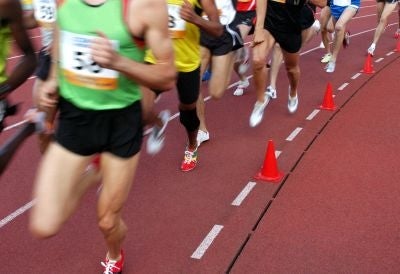Hitting "the wall" can be a disaster for a marathon runner - when dramatic fatigue sets in, typically around mile 21, and it feels like the body has completely run out of gas. But a biomedical engineer and runner has created a mathematical formula that he says can help any athlete avoid the crash.
Published online October 21 in PLoS Computational Biology, a report by Benjamin Rapoport, of Harvard Medical School and MIT, suggests that to avoid the wall, a runner has to maintain a pace that conserves carbohydrates, which serve as the body's gas tank, all the way to the finish line.
"A 10-second difference in pace per mile could make the difference between success and a dramatic failure," said Rapoport in an interview with science publication ScienceNews on October 21. Rapoport, an elite marathon runner himself, said he has had his fair share of pushing too hard and running out of steam by the last few miles.
To calculate the ideal running pace to avoid the wall, Rapoport uses a measure of aerobic capacity called VO2max, which measures how efficiently a body consumes oxygen. It's usually measured with specialized equipment, but can also be estimated by measuring heart rate while running at a steady pace.
ScienceNews reports that "a man with a VO2max of 60 - which, after training, is attainable by only the top 10 percent of male runners - can achieve a 3:10 marathon finish time, according to the model." Elite male marathoners have a VO2max in the high 70s. The average untrained male's number is in the 40s.
How to finish at a faster pace and not crash? Using Rapoport's model, a runner can calculate when to consume a midrace snack, which he suggests is more crucial than loading up on carbohydrates the night before a race.
Rapoport says he plans to create a simple version of his mathematical formula on the web for all runners to access. "My primary goal is to give any marathon runner a qualitative plan for their training," he said.
To access an endurance calculator based on Rapoport's formula: http://endurancecalculator.com/
To read the published article: http://www.ploscompbiol.org/article/info:doi/10.1371/journal.pcbi.1000960
Subscribe to Independent Premium to bookmark this article
Want to bookmark your favourite articles and stories to read or reference later? Start your Independent Premium subscription today.


Join our commenting forum
Join thought-provoking conversations, follow other Independent readers and see their replies